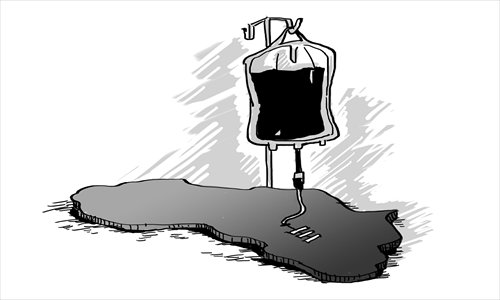China brings healthcare PR to Africa

The story of China in Africa is one of the most complex in the recent times. It has been lauded and criticized in equal scale. The Asian nation's supposed appetite for natural resources has attracted the wrath of the Western nations. In their view, China has a keen focus on exploiting Africa's vast wealth.
The impact of these observation has, however, been dwarfed by Beijing's considerable investments in the continent.
From South Africa to Libya, Senegal to Ethiopia, Africa is literally interlinked through ultra-modern roads. China is also putting up energy projects in over 10 countries in Africa to cut erratic and costly supplies.
Having concretized its gains and achieved significant backing in the commercial sector, China is now shifting to healthcare, a relatively new tactic in courting Africa.
Popularly referred to as "health diplomacy," it involves the sending of teams of medical experts to Africa, construction of healthcare centers, procurement of medical gear, and the training of medical staff.
To date, China has sent over 18,500 medical staff to more than 48 nations in Africa. The teams have treated about 200 million people. In 2010 alone, 1,000 Chinese health specialists worked in more than 100 institutions in 40 African countries.
More than $39 billion in foreign aid has been consumed in the construction of hospitals, fighting malaria and provision of medical equipment.
In the Central African Republic, Guinea-Bissau, Zimbabwe and Chad, around 30 malaria prevention and treatment centers have been built, with approximately $30 million-worth of anti-malarial drugs distributed. But that's not all.
Medical assistance in Africa is also being executed to Africa through Chinese companies.
Though seen as part of their corporate social responsibility plans, China sees the move as that of empowering Africans.
In Malawi and Zimbabwe, Anhui Foreign Economic Construction Group, HNA Group and Beijing Tongren Hospital have played a huge role in boosting the local health situation.
To fight the malaria, for example, Beijing-based firms are distributing for free Cotecxin, the most effective anti-malaria drug produced in China, to patients.
While the Asian nation has focused on the prevention of malaria, tuberculosis and HIV/AIDS, the Chinese government now plans to stretch its focus to maternal, pediatric health and the fight against killer ailments such as cancer.
The development is likely to alleviate the heavy financial strain patients in Africa undergo while seeking medical attention in Asian countries such as China and India.
Indeed, India has in the past said it is willing to set up two big hospitals in Kenya and South Africa.
The relative success of China's medical care in Africa seems to emanate from the fact that its provision is on an "anytime, anywhere" basis, unlike that of Western nations whose delivery is usually emergency-focused.
Apart from winning support from Africa in key international platform such as the UN and the WTO, the newfound cooperation is seen as a strategy to boost China's image in the wake of perpetual accusations against the exploitation of Africa. In it, Africans see not only economic empowerment, but also social hope.
But the bilateral cooperation is likely to face a number of challenges.
There is huge criticism that the distribution of medical teams is mainly skewed to nations that are fairly well off. In this case, the poorest nations that need the help most miss out, such Burundi, Mali and Namibia.
In addition, the effectiveness of the use of Cotecxin to treat malaria has been brought to the fore.
In Uganda, for example, nongovernmental organizations have claimed that the drug fails to conform to the expended standards.
More importantly, Africa seems not to have effectively made use of these Chinese doctors.
Indeed, some countries have failed to recognize them while in others, the medical experts have been sent into remote areas where local doctors are unwilling to go.
Going forward, it will be critical that China and Africa establish a common edict to guide the cooperation, and to establish strict quality controls and guarantee healthy working conditions for the doctors to ensure this important project continues.
The author is a journalist on African issues based in Nairobi, Kenya. mkapchanga@gmail.com